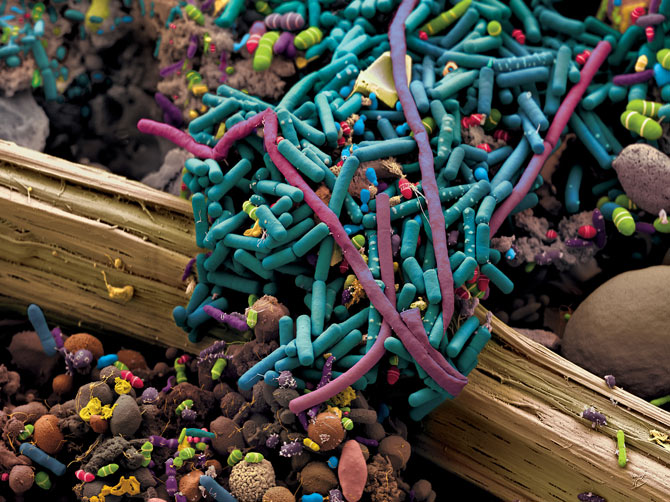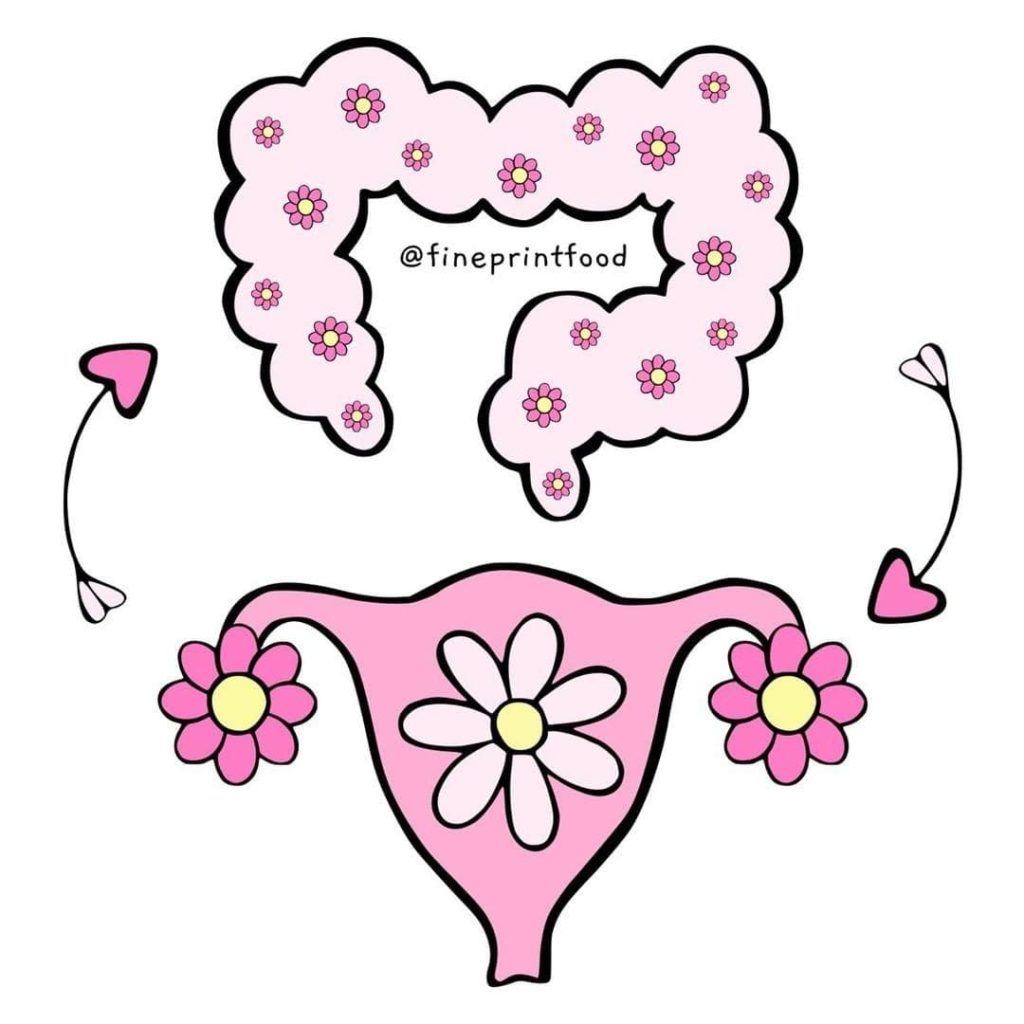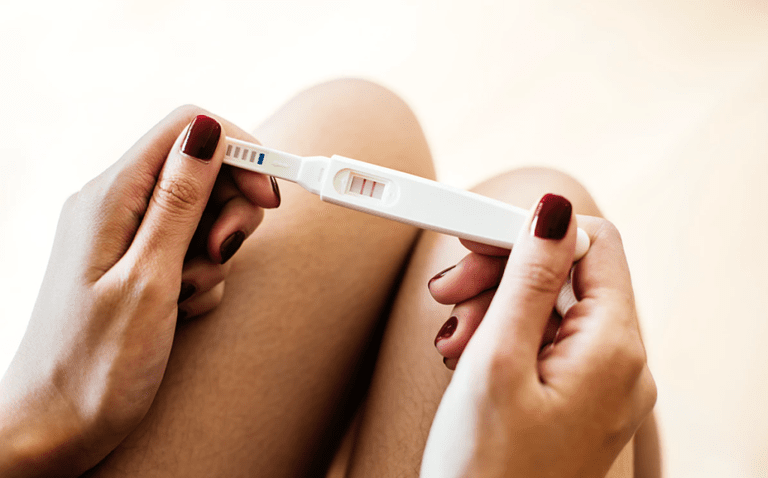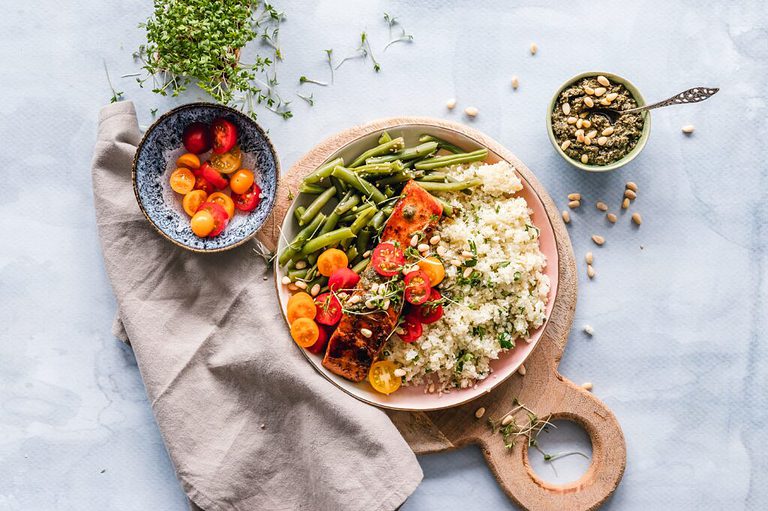Before I became a dietitian, I was a scientist, and in fact, one of my core areas of interest was microbiology – which refers to the science of teeny tiny things, namely bacteria, viruses, and fungi!

I quickly became fascinated with the complex relationship between these tiny creatures which outnumber our own human cells, our diet, and our health, especially when it comes to that critical pre-conception, pregnancy and early childhood period!
You can read more about the gut microbiome from pre-conception to childhood here.
Now, I am increasingly fascinated by the emerging connection between these tiny microbes in our gut and female reproductive hormones, and evidence is starting to emerge that the two do influence each other.
So, will we be talking about the gut-hormone axis, alongside the gut-brain, gut-kidney, and gut-lung axes?
Well, perhaps…
The Estrogen-Gut Microbiome Axis
A 2017 paper has put forward the idea of an estrogen-gut microbiome axis. This can get really science-y, really quickly, so I want to try and keep it simple without disrespecting the complexity of the science of gut microbiome and also female reproductive hormones.
Let’s break it down…
Ideally, we want the bugs that live in our bowels to be diverse and singing along like a symphony, perfectly in tune with one another and giving our ears the gift of beautiful music – this is called symbiosis. When the host (us) and the residents (the bugs) are both getting a benefit!
Sometimes, dysbiosis (or imbalance) occurs or the diversity of our little residents is reduced, this can be caused by a variety of different factors.
Estrogen and phytoestrogens (from soy foods) are activated by an enzyme that some of the bacteria in our gut secrete, called beta-glucuronidase. The broken-down estrogen can then go on and bind to estrogen receptors throughout the body and do its job – yay! This is critical in helping to maintain a healthy and regular menstrual cycle but is also something to consider in diseases which are characterised by low estrogen.
Read more about the facts about soy in this blog post.
Turns out, that what is happening in the gut can then have an impact on the vaginal microbiome too! The broken-down estrogen and phytoestrogens can move through the blood and do work on the vaginal lining and affect the acidity or pH, which can increase or reduce your risk of vaginal infections such as bacterial vaginosis.
Talk about full-circle, the gut-hormone axis is also playing a role when it comes to the vaginal microbiome too!
In short, less diversity of the gut bugs, less of the important enzymes for estrogen activation are being produced and therefore a lower circulating estrogen levels, which could be playing a role in certain diseases.
How do our female reproductive hormones affect our gut?
So just like a nervous brain will give you the runs, and gut dysbiosis can contribute to poorer mental health via the gut-brain axis. The gut-hormone axis is proposed to be a two-way highway.
Interestingly, our female reproductive hormones tend to play a role in irritable bowel syndrome (IBS), which affects 15% of Australians and affects double the number of women compared to men!
We already know that hormones are a factor to consider when talking about IBS, you may have seen this post on my Instagram below.
Just before our menstrual cycle, estrogen rapidly drops, and this tends to worsen bowel symptoms and increase bloating. And then, of course, during our period we are more likely to experience pain and discomfort.
Learn more about the relationship between PCOS and IBS, and endometriosis and IBS.
We don’t have all the answers yet, but we are noticing that a woman’s reproductive hormones are playing a role on several levels in how their IBS plays out, according to the latest research in this area, but keep your eyes peeled for more to come (Mulak et al., 2014)
If you want to learn more about period poops, read my blog here.
Who does this affect?
Personally, I think if you’re a woman and you have a gut, this is relevant information for you to know and understand about your body. However, the authors of this 2017 paper, talk a lot about diseases that estrogen plays some kind of role in, which included:
- Obesity and metabolic syndrome
- Endometriosis
- PCOS
- Infertility
- Cardiovascular disease
To go into each and every one of these would require a blog post in and of itself, so if you’re keen to learn more, let me know by dropping me a message on Instagram or Facebook.
Top tips to keep your gut microbiome healthy and diverse
- See a dietitian about using a probiotic each time you take antibiotics alongside a fibre-rich diet.
- Feed with fibre: ensure you are getting plenty of raw materials (also known as food!) for your gut microbes to munch on, load up on fruit, vegetables, nuts, seeds, wholegrains, legumes and beans. These foods are rich in prebiotics which help stimulate and nurture the growth of those beneficial fibre-loving bacteria. The target is 30 different plants per week, are you up for the challenge?

- Avoid very high protein, very high fat or high sugar diets – (see ya later, keto!) this deprives the gut bugs of fibre and causes more of the protein and fat-digesting bugs to grow which has not been associated with positive health outcomes
- Include fermented foods regularly, think miso, sauerkraut or kimchi, kefir, and probiotic-rich yoghurts to help boost the probiotic content of your diet naturally
- If you are doing a low FODMAP diet as part of your IBS treatment plan, speak to your dietitian about ways to help maintain your gut microbiome diversity and health during this period where it is generally a reduction in prebiotic fibre. Having a well-planned diet will help reduce the risk of altering the gut microbiome and impacting your health and your hormones!
Get my gut-loving green banana pancake recipe
Has this rung a bell? Are you struggling with both your gut and your hormones? Get yourself sorted by a professional, and book yourself in for a FREE 15-minute discovery call with me and let’s chat about how I can help you feel yourself again, on both the gut and hormone front!







